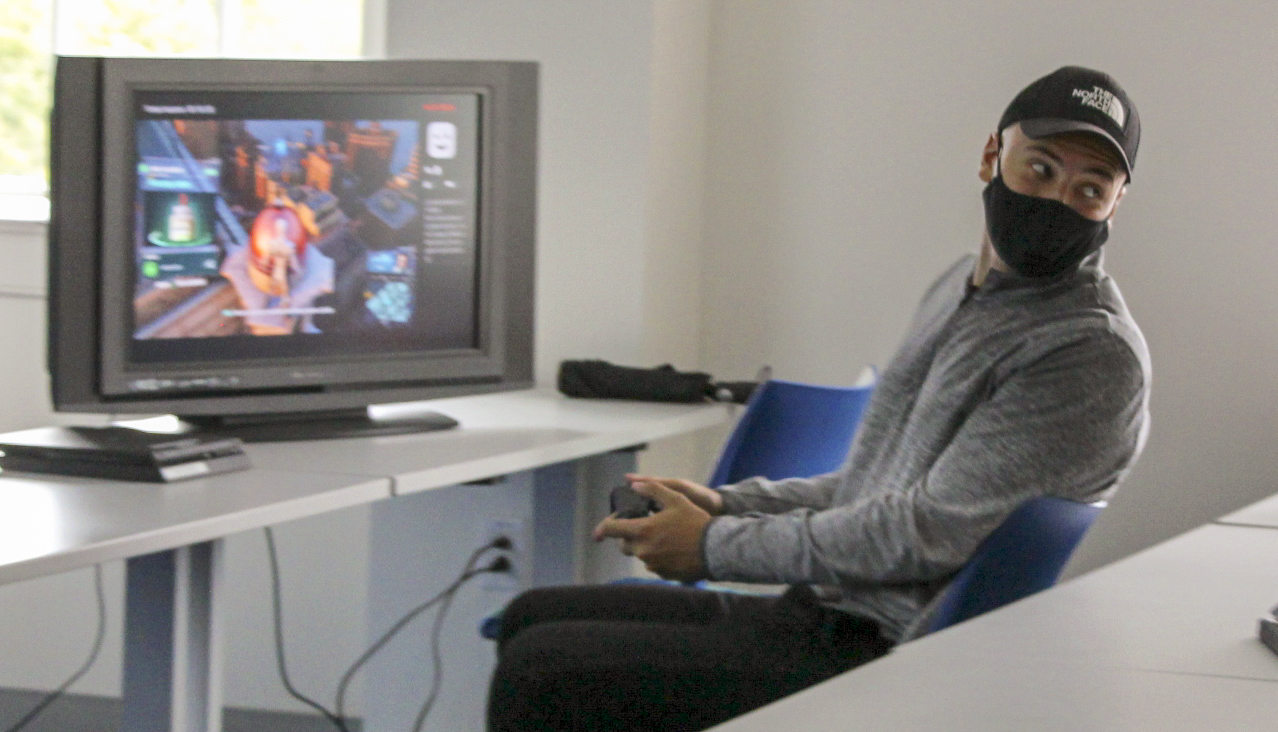Intensive Italian for Gamers melds immersive gameplay with language learning and metacognition.
Associate professor of Italian Brandon Essary could point you to studies, books and papers showing video games are engaging, effective teaching tools. Or he could let a student explain that in just a few words.
“You learn so much more playing the game,” Luis Muller ’22 said during the first language lab presentation in ITL 179: Intensive Italian for Gamers. “I never thought I was good at languages, but I’m picking up words I’ve never studied. I’m proud of myself for that.”
Essary’s course is the first of its kind at Elon and one of few like it in the country. To his knowledge, only his friend and colleague at Saint Louis University, Associate Professor of Italian Simone Bregni, has taught something like it before, and Bregni was the first. Using gameplay as a once-weekly language lab, students engage with Italian to solve problems, understand characters and their motives, and make consequential decisions in real-time. The students play in teams, and those games — the Italian versions with Italian dubbing and subtitles — are streamed over Twitch for students participating remotely.

On a recent Friday in the lab, a student lost a level in the cinematic choose-your-own-adventure “Detroit: Become Human.” His team collectively groaned, recognizing the directions they misunderstood that would have kept their player in the game. They began the level again with a new word in their Italian vocabulary.
“It’s like a multimillion-dollar movie that you have to be the director of,” Essary says. “Even when they’re not the ones holding the controller, they’re all watching and giving input on what decisions to make based on Italian instructions. I couldn’t hand you a book that would do this for you at this level.”
Essary has been researching the effectiveness of gameplay for learning outcomes for years. He jokes that the first Italian he ever met was Mario from Nintendo’s “Super Mario Bros.” franchise. He uses James Paul Gee’s “What Video Games Have to Teach Us About Learning and Literacy” and the author’s 36 principles of video game-based learning as a foundation for the course. Among those principles: interaction, risk-taking, challenge and consideration, and the situated meanings of words.
Students in the course are studying Gee’s principles and using metacognition to understand how gaming promotes quick and meaningful learning of language. During monthly presentations with their team, they deconstruct their recorded gameplay and discuss relevant vocabulary and the metacognition involved in learning through the game.
“The nature of gaming makes you want to learn more,” Essary says. “You see the emotion when they play. In that moment, it’s all about whether they know the Italian or they don’t know the Italian. If they don’t, they’ll do almost anything to learn it.”
He sees a future in language classrooms beginning in childhood that would bring about foreign language fluency early in life and make it easier to be a global citizen.
 “What if you could have been playing in Spanish as soon as you started playing? You would have absolutely loved it because you already loved the game,” Essary says. That early learning would promote lifelong bilingual skills and easier transition to second-language learning in secondary and undergraduate education settings.
“What if you could have been playing in Spanish as soon as you started playing? You would have absolutely loved it because you already loved the game,” Essary says. That early learning would promote lifelong bilingual skills and easier transition to second-language learning in secondary and undergraduate education settings.
Essary collaborated with Bregni in designing the course. Bregni has taught similar Italian courses using interactive video games twice at Saint Louis University and has been using video games in language learning since the 1990s.
The pair has developed a proposal for a textbook on the pedagogy and is seeking a publisher.
Essary’s research of the value of gaming in education and efforts to bring it to Elon classrooms was funded by grants from the Center for the Advancement of Teaching and Learning, Elon College, the College of Arts and Sciences, and the Academic Technology Committee.
“It’s been years in the making,” Essary says. “It’s the coolest thing I’ve done.”



